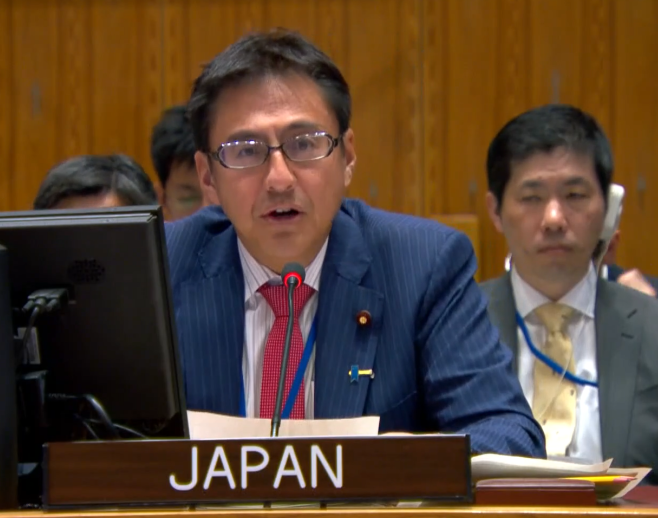AIに関する安保理公開会合における武井副大臣ステートメント
令和5年7月18日

Mr. President,
I commend your initiative to take up AI in the Security Council. This will be a good beginning for future global discussions on this issue. I also thank the Secretary-General and the other briefers.
AI is changing the world. AI has transformed human life. Its speed, potential and risks go beyond our imagination and national borders.
We are being tested at this historical juncture: can we have the self-discipline to control AI?
Mr. President,
My political belief is, “instead of worrying, deal with it.”
I believe that the key to take on the challenge is two-fold: “human-centric and trustworthy AI.”
Human beings can and should control AI to enhance human potential, not the other way around. Let me make two points.
First, “human-centric AI.” The development of AI should be consistent with our democratic values and fundamental human rights. AI should not be a tool for rulers, but should be placed under the rule of law.
The military use of AI is a case in point. It should be responsible, transparent and based on international law. Japan will continue to contribute to the international rule-making process on LAWS in the CCW.
Second, “trustworthy AI.” AI can be more trustworthy with a wide range of stakeholders included in the rule-making process. I believe that the convening power of the UN can make a difference and bring together wisdom from around the world.
Last month, Japan led discussions at the UN on the misuse of AI by terrorists by hosting a side event with UNOCT and UNICRI.
Japan is also proud to have launched the G7 Hiroshima AI Process this year and to lead the global discussion on generative AI.
Mr. President,
The Security Council and the UN can update its toolkit through the use of AI.
First, we should consider how the active use of AI can enhance the efficiency and transparency of this Council in its decision-making and working methods.
Also, we welcome the efforts by the Secretariat to utilize AI for mediation and peacebuilding activities.
Moreover, we can make the UN work more efficiently and effectively through AI-based early warning systems for conflicts, sanctions implementation monitoring, and counter-measures against disinformation.
Let me conclude by expressing our readiness to actively participate in the discussions on AI at the UN and beyond.
Thank you, Mr. President.
